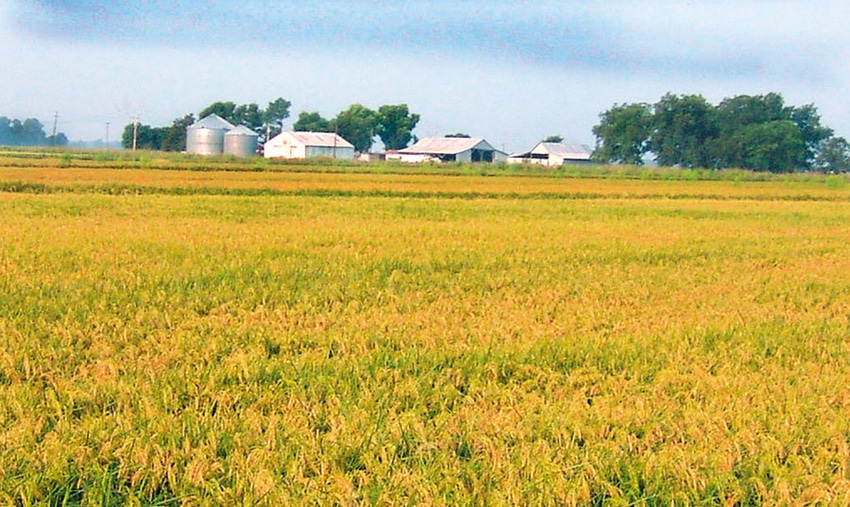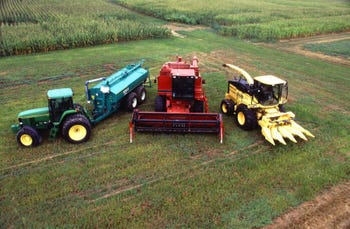
"Given the outlook for further growth in land prices in the coming years, and the increasing value of equipment, buildings, grain bins, and other assets, I can promise you: if you don’t have an estate plan, you’re going to get hosed by the IRS,” says Ed Gillentine, a Certified Financial Planner and Chartered Financial Consultant, who spoke at the annual meeting of the Mississippi Land Bank.


DAVID LOFTIN, from left, Mississippi Land Bank, Tupelo; Alfred Fischer, Fischer Farm Services, Aberdeen; and Bobby Spinks, Mississippi Land Bank, Clarksdale, were among those attending the annual meeting of the Mississippi Land Bank.
There are two things you need for your farming operation, says Ed Gillentine: an estate plan and a knowledgeable, trusted tax professional. Otherwise, he says, the consequences to you and your heirs could be unnecessarily costly.
“I’ve worked with hundreds of estates, and I’ve never seen an estate that worked out well without some type of plan,” he said at the annual meeting of the Mississippi Land Bank. “Given the outlook for further growth in land prices in the coming years, and the increasing value of your equipment, buildings, and other assets, I can promise you: if you don’t have a plan, you’re going to get hosed.”
Gillentine, a Certified Financial Planner and Chartered Financial Consultant with the Memphis firm, Williams & Gillentine Legacy Planning LLC, specializes in large estate transfers and philanthropic strategies, focusing on research, planning, and wealth management for families in the highest tax brackets.
“You may not think you have an estate large enough to worry about,” he says, “but with today’s land prices and the value of equipment, storage bins, and other assets, it quickly adds up.”
Two situations with potential for costly dealings with the IRS, he says, involve those who are “land-rich and cash-poor” and those who have land that has passed down through generations, but have not made provisions for taxes on the increased value.
“Land-rich, cash-poor is something we see a lot,” Gillentine says. “When you have a lot of land, you may look wealthy on paper — but if you don’t have any operating cash, you have problems.
“What we often see is land that has come down through generations and is now far more valuable, or land that has increased in value since it was purchased.
As the size of the farm grows – and you add a couple of combines, some tractors, a building or two — and you’ve now got several hundred or several thousand acres, it doesn’t take long until you get into millions of dollars of value. With inflation alone, it’s amazing how much the value of your assets can increase.”
For 2013, the IRS lifetime exemption for estate taxes is $5.25 million, he notes. It’s twice that much if you’re married, and the exemption automatically rolls over to the surviving spouse, for a total of $10.5 million.
“The tax rate for 2013 is 40 percent of anything over the exemption limit,” Gillentine says. “That’s what Uncle Sam gets if you die. You need to know these numbers, and you need to know that Congress can change them. When Congress can’t find any more money to cover their spending, where do you think they’re going to go? They’re going to go to the estate tax, because it’s not going to affect the masses, and they know they can raise the estate tax and still get enough votes to be re-elected.
“If Congress reduces the exemption and your farm’s value keeps going up, you can very quickly hit the limit. Once your farm’s value gets to about half the exemption amount, you need to be consulting with your CPA and your attorney.”
International buyers pushing up values
International investors are now buying U.S. farm land and pushing up prices, which can also have an effect on your farm, he says.
“The Argentine/Chinese/European investment money that’s coming here is typically limitless. That’s why they’re buying land here — they can’t spend it all in their own countries. Their purchases will drive up prices of land in the area, which will boost the value your land.
“If you’ve been paying property taxes based on land value of $1 or $2 million, and the value increases to $4 million or $5 million because international investors are bidding up prices, where are you going to get money to pay the tax bill?
“You typically only have 5 months to 9 months to pay property taxes, so if you’re not doing some planning for adequate operating cash, you could be in trouble and might have to sell some land at fire sale prices. As my grandfather used to say, ‘You’ll be in deep weeds.’
“I’ve seen the tax returns of many who didn’t plan,” Gillentine says, “and they often were facing large amounts of estate tax on a farm that they had worked their entire life to build. The problem, if you go over the exemption limits, is that you’ve then got to come up with 40 percent of the value of the assets for Uncle Sam.

A GROWING INVENTORY of equipment, land, buildings, and other assets can push farm valuations past the IRS lifetime exemption for estate taxes.
“And I can tell you, the IRS likes to value such assets fairly generously. If it’s farmland that’s been in the family for generations, in an area where there haven’t been many land transactions to provide a basis for establishing value, the IRS will set the value — and they may set it far above what you think it should be.
“You don’t want to put the next generation in this predicament. Can you imagine your children, to whom you want to pass your farm, being confronted with a huge estate tax bill and no way to pay it except to sell off assets? Most kids want to do what’s right to preserve the family’s assets, but in the absence of any direction from the patriarch, in the absence of adequate cash, they’re often forced to sell the farm to pay the taxes and move on.”
Passing land through generations, with one generation selling to the next for a token $1, can create “all sorts of problems,” Gillentine says. “You should never do this; IRS penalties for 25 or 30 years of back taxes can pile up in a hurry.”
He cited the example of a small farm in a Mid-South state that had been in the family for five generations, being passed with the token $1 transfer.
“It was 60 acres near a metropolitan/tourist area. As the city grew and tourism increased, land values increased enormously. There were subdivisions of $500,000 homes, with new schools and businesses. The farm that had been valued at $1,000 per acre went from being worth $60,000 to being valued at more than $6 million. They were looking at about $1.5 million in taxes. These were just normal people who found themselves with a serious problem, which was compounded by their having passed it down over the years at a cost basis of $1.”
Consider family differences
Squabbles within a family can also be the source of problems, Gillentine says, citing a family that bought a beach vacation home in Florida 50 years ago. “Over the decades, it was damaged or destroyed by hurricanes several times, and was rebuilt, each time larger and better, and was now worth $ $2 million. There were several heirs, some of whom didn’t like each other, one in poor health, one who wanted to sell and have his share now, and two who wanted to keep the property, but didn’t have the money to buy out the others. Their options, in an depressed housing market, were selling now for $1 million or the two people who wanted to keep the house coming up with $500,000 each. Any way it went, nobody would win.
“Do some planning before it comes to this. If you know your kids aren’t getting along, look the situation in the eye and deal with it in advance — or I can promise you Thanksgivings and Christmases aren’t going to be much fun at your house.”
No matter how you look at taxes, no matter where you are on the socio-economic scale, Gillentine says, “It’s very rare these days that you can do your taxes yourself or go to the corner tax preparation office and get them done. Most farms are big business, and you need good tax advice.
“Find somebody you trust, who knows taxes and is good at tax advice. The tax code is now over 70,000 pages and these professionals can be invaluable in helping you do what’s needed to comply with the rules.
“Find a CPA who’s good at what they do and is good at knowing what you do. Good intentions don’t work with the IRS — if you make a mistake, you still will face penalties and taxes, and some people even go to jail.
“Don’t be intimidated by the IRS — but respect the IRS. You may not understand the tax code, but as long as you understand what you spend money for in your farm/business, and how it can flow through the tax code, and you play by the rules, you’re going to be OK.
“But you need a tax advisor who will do two things: Inform you every year of the new tax laws and then explain how they will apply to your business. He or she should be willing to talk with you, answer your questions, and be a team member.”
Trusted advisors can also be bankers, Gillentine says. “I’ve worked with big banks, little banks, all kinds of banks — those that have weathered the banking crisis and are still standing are often relational banks. They may not always have the lowest interest rates, but they go out of their way to help their clients and provide service. If you’ve got one of these relational bankers, stick with them. When another banking bubble comes along, they’re the kind of people you want to be associated with.”
Gillentine says a lot of people get caught up in the idea of saving on taxes and will spend a lot of money just to get a deduction.
“I know professionals who will spend $85,000 on a tricked-out Cadillac Escalade just because they can get a $35,000 business tax deduction. Don’t ever let the tax tail wag the dog. Does it really make good business sense to spend $50,000 just to get a $35,000 tax deduction?”
About the Author(s)
You May Also Like



